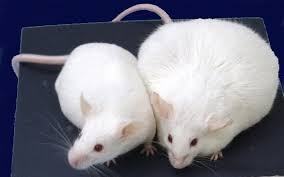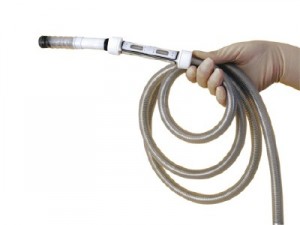Does My Stool Make me Look Fat – or, Poop, Bugs, and Obesity
There are differences in the gut bacteria between lean and obese people. This has led to the question – how much do our gut bugs have to do with whether we are fat or thin? Some experiments in mice and men have kept this question going.

When mice are given the bugs from obese mice, they become obese. Are we mice or men?
In mice that are germ-free, giving them gut microbes from obese mice the germ free mice become obese.
In humans there have been studies that the “lean body microbes” transferred to people with metabolic syndrome led to improved insulin sensitivity compared to those who had “standard” microbes.
So with that as a background comes a case from Rhode Island where a fecal microbiota transplantation (FMT) was done for a patient who had a chronic infection with antibiotic associated colitis (diarrhea). But then, the patient becomes clinically obese after getting the microbes from her daughter (who, they note, is overweight). The question being – if you get a fecal transplant from someone who is obese, will you become obese, or if you get a fecal transplant from someone who is thin, will you become thing? So first- lets look at this case (names have been changed to protect anonymity).
The case from Rhode Island (or mom gets fecal transplant and gains weight)
You can imagine the frustration for Stacy: for six months one course after another of antibiotics to rid of a bacterial infection in the colon. The treatments were ten days of one antibiotic, two weeks of another, twelve weeks of another, even a probiotic thrown into the mix. Each time it seemed like it was improving, only to come back, after the treatment finished, with more abdominal pain and diarrhea. Along the way the gastroenterologist discovered H. Pylori in the stomach, so more antibiotics to treat that.
So when the gastroenterologist recommended that Stacy undergo a fecal transplant it somehow seemed reasonable. The process would involve taking the fecal bacteria from a relative (she chose her 16 year old daughter, Ruth) and doing colonoscopy to spread the material through her colon.
The whole cycle started with inflammation of her vagina that her doctor prescribed Stacy antibiotics to treat. Unfortunately, around the same time, Stacy had been close to a family member who had Clostridium(the bacteria that causes antibiotic associated diarrhea).
Thankfully the fecal transplant worked, her daughter’s bacteria took up residence in her colon and kicked out the Clostridium. After six months of expensive treatment, and no success, Stacy was free of diarrhea and abdominal pain.
But then Stacy began to gain weight. When Stacy returned to clinic 16 months later she had gone from 136 pounds to 170 pounds. She went on one of the liquid protein, medically supervised diets, but that didn’t seem to help. She was hungry. The GI doctors noted that her daughter was now clinically obese, so they reported this case and noted that when they do fecal transplants, in addition to ruling out other diseases, they were going to make certain the person was not obese.
So did Stacy become obese because she received the bugs for obesity from her daughter?
Skeptical About the Gut Bugs
Stacy was five foot tall and weighed 136 pounds she was chronically ill with an ongoing bacterial infection causing chronic diarrhea, abdominal pain. The antibiotics she was given pretty much changed her normal gut bacteria, and led to the antibiotic associated diarrhea. Her BMI (height weight ratio) was 26.6 when she received the transplant (overweight, but not yet obese), and over the course of 16 months gained 34 pounds.
The offending stool bacteria came from her daughter, Ruth, who at five foot one inches and at the time weighed 140 pounds. They said this was overweight, with a BMI of 26.2, but she had the same height-weight ratio as her mom, Stacy, when she “donated” that bacterial organ. Ruth, in those 16 months also gained 30 pounds and has a BMI of 32.
Besides getting some bacteria from someone who had the same height/weight ratio, what other causes could explain this?
When getting rid of H pylori there has been noted an increase in the appetite hormone, ghrelin, and Stacy noted that after she had the treatment something in her changed. Her ghrelin probably increased. A small increase in appetite, and in this case, it would not take much to account for that weight gain over those sixteen months.
The diet of the mother and daughter are probably similar – they live in the same household, probably eat together, and eat the same things. Both Stacy and Ruth gained about two pounds per month, which means eating about 250 calories a day more than she burned (the equivalent of a single candy bar, or protein bar.) Stacy’s BMR is 1350 calories, and with a sedentary life her body would daily burn about 1620 calories a day. To gain an average of two pounds a month she would need to eat a diet of about 1870 calories a day.
There is no food log recorded, or even guessed about, what Stacy, or her daughter, ate since her fecal transplant in 2011. One of her doctors put her on a failed diet, liquid protein and exercise program. While a liquid diet and exercise program might cause temporary weight loss, it will not lead to permanent weight loss without lifestyle changes. Most individuals who do the quick fix liquid protein diets end up regaining their weight quickly, and usually a bit more. There is no evidence that this patient, or her daughter, had developed lifestyle changes – although it is probable that the diets of both mother and daughter were similar.
What is also missing is the microbiome of the daughter and the mother. What is almost certain is that, when the mother was healthy, she and her daughter had nearly identical microbiome. The daughters gut began to be filled with the mother’s bacteria going through the birth canal (assuming it was not a C-section). The daughter, with every toy she put into her mouth picked up the bacteria that the mother shed. The microbiome of mothers and daughters are almost always nearly identical.
Possibilities:
- Stool bacteria caused increase in weight
- Loss of H pylori caused increase in appetite, and that small increase led to the weight gain (only 250 calories a day more)
- Similar diet caused similar weight increase between parent and child.
Occam’s razor would say- they both started out clinically overweight, probably ate the same things, and this was less about gut bacteria and more about their diet. The caution in the article was to use feces from someone who is not obese, as well as individuals who are otherwise healthy. What was lacking in the article was detail about their diet, or a measurement of ghrelin pre fecal transplant and post fecal transplant. What was also missing was the composition of the gut bacteria.
It is clear that bacteria do rule us in some ways- but changing those bacteria is as easy as changing the foods that are fed, one does not need to get a fecal transplant. One study showed that people who ate more Granny Smith Apples had a higher presence of the gut bacteria called Christensenellaceae. When these classes of bacteria were introduced into the guts of mice they had gained less weight than those who did not receive this bacteria.
PreBiotics:

Turns out that Granny Smith Apples provide the food that “thin people bacteria” like. So maybe an apple a day is a good thing.
The fibers and polyphenols in the Granny Smith apples are not digested or altered by the time they reach the colon and the bacteria in the colon who prefer these produce the butyric acid that continues to harbor the growth of those good bacteria. The researchers not only tested Granny Smith but also Braeburn, Fuji, Gala, Golden Delicious, McIntosh, and Red Delicious. Granny Smith was the apple that provided the best source of ingredients to insure high quantities of those good bacteria.
Feeding the foods that cause an increase in the “good” bacteria are called pre-biotics. So our future may be the bacteria that we cultivate- with the food we choose to cultivate it with.
There are a couple of morals to the story:
Random use of antibiotics for most issues are unnecessary and can lead to harm. Stacy may not have needed antibiotics for her vaginal inflammation. Many children do not need antibiotics for ear inflammation, but they do need them for an infection.
If you publish a paper about gut microbiome- you should at least get that microbiome tested to see the bacteria it contains.
I don’t know about you – but given a choice between a fecal transplant for being thin and eating more vegetables and Granny Smith apples- I will take the apples.
No matter what your fecal bacteria are, you can change them by what you eat. What you eat has an impact on your weight. Increasing the fruits and vegetables in any diet has a positive effect on weight and on health.
The gut microbiome holds many more secrets – and while we are all enthused to find those, lets not forget a few basics – what we eat may have more to do with our weight, and more to do with the bacteria we grow in our guts, than the bacteria have to do with it. Now- do I want the Doritos or that apple?

So do you want a fecal transplant or eat more vegetables? I don’t know- but I prefer my coffee from the top. I also prefer to feed the good bacteria than to get a new set.
References
Assessing non-digestible compounds in apple cultivars and their potential as modulators of obese faecal microbiota in vitro. Condezo-Hoyos L, Mohanty IP, Noratto GD. Food Chem. 2014 Oct 15;161:208-15 Pub Med ID 24837942
Weight Gain After Fecal Microbiota Transplantation. Alang, N, and Kelly, C.R. Open Forum Infect. Disease Vol2, Issue 1.
Gut microbiota from twins discordant for obesity modulate metabolism in mice. Ridaura VK, Faith JJ, Rey FE, et al. Science 2013. Pub Med ID 24009397
Transfer of intestinal microbiota from lean donors increases insulin sensitivity in individuals with metabolic syndrome. Vrieze A, Van Nood E, Holleman F, et al. Gastroenterology. 2013 PMID 22728514
Review article: Associations between Helicobacter pylori and obesity–an ecological study. Lender N, Talley JN, Enck P, et al. Aliument Pharmacol Ther. 2014. PMID 24832176
Ingestion of lactobacillus strain regulates emotional behavior and central GABA receptor expression in a mouse via the vagus nerve. Bravo JA, Forsythe P, Chew MV, et al. Proc Natl Acad Sci U S A. 2011 PMID 21876150
